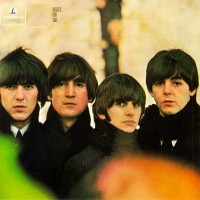
I bought my first Beatles record (Help!) at age nine, barely tall enough to see over the cashier’s counter at Record Town, a now long-defunct shopping mall record store in the western Massachusetts town where I grew up. Nearly 30 years later, I plunked down $250+ for the remastered stereo box set shortly after the Beatles’ catalog overhaul in the fall of 2009. In between those two milestones, my Fab Four fandom has been constant, obsessive, and undying, yet my album preferences have been inexplicably capricious. But one area where I’ve never wavered concerns an album, little discussed, that the band put out at the tail end of 1964. It is called Beatles for Sale.
A cursory glance at the cover and a light listen to the record don’t immediately reveal its brilliance. This is early Beatles, for sure. Cover songs abound, representing almost half of the album’s material. (They would significantly tone down this practice on their next album, Help!, and completely abandon it for good by the time of Rubber Soul.) But a closer listen to the album’s opener, “No Reply”, informs us that we are venturing into new territory. A beautiful study in contrasts between thundering drums and wistful acoustic guitars with hints of bossa nova, the song denotes a sound that’s more accomplished, more sophisticated, than anything that has come before. As an added bonus, we have only one overplayed track, “Eight Days a Week”. These days, I can barely listen to this song whenever it comes on the radio, but here, as a part of larger musical statement, it never gets old.
Though Beatles for Sale is in all aspects a group effort, it’s Lennon who provides its show-stoppers. His interpretation of Chuck Berry’s “Rock and Roll Music”, like his earlier renderings of “Twist and Shout” and “Money”, continues to establish him as howler without peer; it easily blows the original out of the water. With songs like “I’m a Loser” and “I Don’t Want to Spoil the Party”, he begins to lay the template for the confessional songwriting that he would explore much more deeply later, but seldom while rocking this hard. But for my money, my favorite Lennon moment on Beatles for Sale is “Mr. Moonlight”. Some fans and critics think this is one of of the worst Beatles tracks ever, but I love it! Lennon’s crazed gospel preacher vocals launch it into the stratosphere. The chorus is almost dirge-like, and the loungey organ solo only adds to its weirdness. In some ways, it’s more out there than anything on Revolver or Sgt. Pepper’s; they’d certainly never record anything like it again. Though McCartney also gets in a good rocker with his cover of Little Richard’s “Kansas City”, his overall contribution is a bit more understated than Lennon’s. Still, it’s no less important. He really only takes lead vocals on a couple of songs, but “I’ll Follow the Sun” is one of his early masterpieces, one that hints at the A-list tunesmithing that people would soon take for granted. The album’s unsung hero, however, is George Harrison. Though relegated as usual to his one token spotlight moment (a cover of Carl Perkins’ “Everbody’s Trying to Be My Baby”), his fingerprints are all over everything. Often accused by “serious” musicians of being a mediocre guitarist, here he proves all of these Philistines wrong. Effortlessly shifting between elegant country picking and precision power-chording, what his playing lacks in technical prowess is more than made up for with vibrant and highly evocative tones; in fact, a large part of Beatles for Sale’s success can be attributed to its Big Guitar sound. Then there’s Ringo. His noble back-beat carries the music through no matter what the situation demands. There’s not much more to be said about that, except that he’s just always awesome.
This was the record that UK punters got. In the states, much of this material was spread out among a pair of shorter Capitol Records releases (Beatles ‘65 and Beatles VI), a double-dipping practice that the label found lucrative but which drove the Beatles themselves crazy. Arguments could be made for all versions, certainly. But the fact is, this is how John, Paul, George, and Ringo wanted you to hear these songs. They were probably right; it all just seems to hold together better here.
We all know what happened next. The Beatles would discover marijuana, Dylan, and eventually LSD. They would take their music to hitherto unimagined artistic heights and become a four-headed spokesman of a generation. But I ask you this: As a stripped-down and no-nonsense rock and roll band, did the Beatles ever kick this much ass? I think not. —Richard P


